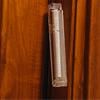A common misconception is that only the main entrance to the home requires a mezuzah. Of course, it is better to have one mezuzah on the front door than no mezuzahs, and if you only have one mezuzah, it should be placed on the home's main entrance. However, to properly fulfill the mitzvah, every room in the house or office should have its own mezuzah.
All rooms that are more than four cubits long and four cubits wide — approximately 6.3 feet by 6.3 feet (or its equivalent of 39.6 square feet in any shape) are required to have a mezuzah — as long as they have a full "doorway." A blessing, however, is not recited unless the room actually extends at least 6.3 feet in each direction.
A doorway that requires a mezuzah is only one that that has two doorposts and a lintel connecting the doorposts on top. If these conditions do not exist, a competent Rabbi should be consulted to determine whether or not that entryway requires a mezuzah.
One does not affix a Mezuzah on bathrooms, shower rooms or the like.
Do garage doors, boiler rooms, attics, outdoor sheds, or crawl spaces require mezuzahs?
Yes, they do, provided that they comply with the required measurements. At the entrance to a crawl space, the doorposts themselves must be at least 10 handbreadths high (approximately 32 inches).
An attic also requires a mezuzah unless it is entered via a "trapdoor" (a horizontal opening in the floor rather than a vertical opening in a wall).
What about porches or sun porches?
There is a difference of opinion whether the mezuzah is to be placed on the right side relative to a person entering the house, or on the right side relative to a person going out onto the porch.
Am I obligated to affix a mezuzah on the doorpost of a gate that leads to my backyard?
One has to affix a mezuzah only if there is a cross bar on top of that gate.
Do I need a mezuzah at my workplace?
Yes. In addition to private places of residence, mezuzahs should be affixed in businesses and stores without a blessing.
If you’re working for a non-Jew and you are renting space from him, a mezuzah should be affixed on your office door without a blessing.
However, if you are not renting the space, and there is the possibility that your office space could be relocated, then you would be exempt from affixing a mezuzah.
We have a non-Jewish live-in housekeeper. Am I required to put a mezuzah on her door?
Yes, providing that upon your discretion, her room may be changed to another location in the house at any given time.
What if I never use that door?
Unused doors that are sealed closed (doors actually nailed to the door frame) are exempt from mezuzahs. An entrance that is blocked by furniture or a door that is usually kept locked requires a mezuzah.
When Do I Need a Mezuzah?
When purchasing a home, affix the mezuzahs, with the blessing, immediately upon moving in.
If you are renting the home or apartment the obligation to install a Mezuzah applies only after thirty days. However it is obviously preferred not to be without a Mezuzah, therefore many have the custom to affix all of the mezuzahs immediately upon occupancy, without reciting the blessing. Once the 30-day period has elapsed, one of the mezuzahs (from a room that has a door) should be removed, checked and replaced. That mezuzah may also be replaced with a new or upgraded one. The proper blessing is then recited on the new Mezuzah while having in mind the other Mezuzahs as well.
Some have the custom of temporarily affixing the mezuzahs immediately upon occupancy using tape, and nailing them in on the 31st day. The first mezuzah that is nailed in should be on a room that has a door. The blessing is recited at that time.
The above applies only outside the Land of Israel. In the Holy Land, the mezuzahs are affixed immediately with a blessing.








Join the Discussion